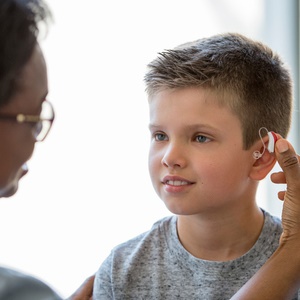
With the latest technology no deaf child needs to remain captive in a world of silence. See what options are now available to help your child.
BY THE YOU PULSE TEAM
Imagine a world where deaf children, through the help of technology, can join their hearing friends in the classroom and chat with ease.
According to hearing experts such a world is no longer a figment of the imagination.
It is something we can have today – if only we could afford it and could implement internationally proven plans.
Early detection of hearing impairment and sophisticated new technology now enable audiologists and doctors to teach deaf children to hear and talk, even if the child has only 1% hearing.
If hearing loss can be diagnosed before a baby is six months old, parents can be taught to develop their baby's brain and teach their child to speak before the brain loses its ability to learn a new language, says ear, nose and throat (ENT) specialist Dr Derrick Wagenfeld of Somerset West.
He is involved in efforts to help deaf children hear again and also works with the Carel du Toit Centre for speech development in Cape Town.
Small window period
Tygerberg Hospital audiologist Lida Müller says early detection is critical because there is only a small window period during which a baby can be helped.
Studies have shown that children who receive cochlear implants before the age of six months and who attend habilitation progammes can chatter away like their hearing friends within five years.
The earlier the brain paths can be stimulated for hearing and language development, the better a child with hearing loss can learn to hear and talk normally.
The tests to determine whether a baby has a hearing impediment are quick and simple, which is why all American parents are obliged to have a hearing screening test done on newborn babies.
If a hearing impediment is diagnosed early the child can receive a cochlear implant or other hearing aid from day one. These devices are so sophisticated nowadays that they enable children to have virtually normal hearing.
Hearing tested too late
But in South Africa the majority of children have their hearing tested too late. Now a group of ENT specialists and audiologists are striving to get the simple hearing test made compulsory for newborn babies here too, but they haven't had much success at state hospitals thus far.
Most private hospitals do conduct a simple hearing screening test on two-day-old babies if the parents consent.
Medical schemes pay for this test. In some academic hospitals the test is done free on babies with a high risk of hearing problems.
Compulsory hearing tests are the first step towards making permanent disability due to deafness, and even the need for sign language, something of the past, says Laurette du Preez, head of the Carel du Toit Centre in Tygerberg.
These centres (situated across the country) offer a comprehensive habilitation programme, so called because it does not restore hearing but enables deaf or hearing impaired children to have the best possible hearing. The team assisting the centres includes ENT specialists, audiologists, speech therapists, teachers, social workers and psychologists.
The role of parents in this process is of utmost importance.
The hearing screening test costs R72. According to Du Preez, the cost plays a role but the biggest obstacle to implementing it is the lack of good primary healthcare, particularly in rural areas.
"The government will not readily agree to making the test compulsory because primary healthcare services are not yet established," Du Preez says.
The second major obstacle in the hearing path of deaf children is the high cost of a cochlear implant. At R185 000 it's extremely expensive but it could mean the child could eventually speak normally and attend a mainstream school.
Implants make dramatic difference
Many South African children who had cochlear implants as babies or toddlers can hear today.
Some of them are in mainstream schools, talk with normal inflections, phone their friends and can hear conversations in noisy clubs where they dance to the beat of music.
Were it not for the relatively inconspicuous flesh-coloured hearing aids behind their ears it would be difficult to tell that any of them had a hearing problem. It is incredible to think some of them had less than one per cent hearing.
Nearly all the children to whom YOU Pulse spoke have greater hearing loss than thousands of other South Africans who communicate with sign language and lip-reading.
How is it possible that a deaf baby can learn to hear? The late Professor Carel du Toit, then head of the ENT department at the University of Stellenbosch and Tygerberg Hospital, proved with pioneering work that in virtually every deaf child some trace of hearing remains intact.
He also believed if you enhance this bit of remaining hearing – even if it is only 1% - with a hearing aid, you can teach the deaf child to "learn" to hear and talk normally. He proved this in the era before cochlear implants and hearing aids. Now the process is made much easier with cochlear implants but it's still imperative that it be done within the critical window period.
It's a tragic fact that only one in every five South Africans needing a hearing aid can afford it and that the other four, for this reason, will never be able to hear.
Read more:
Children: common causes of deafness
Hearing technology – the latest
Prevent infection of the middle ear
(This is an extract of an article that originally appeared in the YOU Pulse / Huisgenoot-POLS magazine, Spring 2007. Buy the latest copy, on newsstands now, for more fascinating stories in the world of health and wellness.)
Visit Parent24.com for more parenting information.




 Publications
Publications
 Partners
Partners











